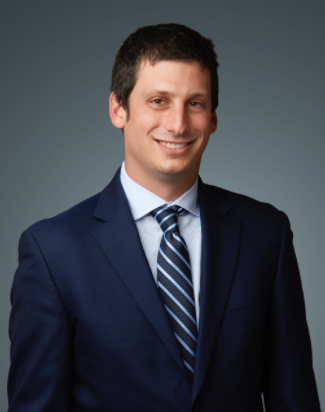Brad Loren is an associate at McAndrews Held and Malloy Ltd. (McAndrews).
Prior to attending law school, Brad attended the University of Iowa where he  earned a B.A. in Chemistry and Political Science. After earning his undergraduate degrees, Brad attended Purdue University where he earned his Ph.D. in Organic Chemistry. Brad’s Ph.D. research focused on pharmaceutical development, specifically organic synthesis and drug delivery. After earning his Ph.D., Brad attended Loyola University Chicago School of Law, where he graduated cum laude in 2021.
earned a B.A. in Chemistry and Political Science. After earning his undergraduate degrees, Brad attended Purdue University where he earned his Ph.D. in Organic Chemistry. Brad’s Ph.D. research focused on pharmaceutical development, specifically organic synthesis and drug delivery. After earning his Ph.D., Brad attended Loyola University Chicago School of Law, where he graduated cum laude in 2021.
Why did you choose Loyola and why would you recommend it to incoming law students?
When I began applying to law schools, I narrowed my search to the Chicago area because I grew up here and wanted to return to the area with my wife.

After visiting Loyola and speaking to some of the students, I felt confident that the law school nurtured a collaborative environment where students had the mindset of helping each other.
In addition, when I was applying to law schools, I was aware that I wanted to pursue a career in patent law. After getting the opportunity to speak with Professor Ho, I became truly confident that Loyola would be a good place for me to pursue this goal because I would have the support that I needed to succeed.
Can you tell me when you became interested in IP and why? Did you become interested in IP before or during school?
I became interested in the field of intellectual property law before applying to law school. However, when I entered the University of Iowa, I did not have law school in mind. The first thoughts of law school arose when I became involved with a chemistry research group. My research professors introduced me to what intellectual property was generally, but I did not start to seriously consider law school until I was in the second half of my Ph.D. program.
For me, pursuing a career in patent law was a great way to merge my interests. I knew that patent law would allow me to stay on top of the latest innovative research and technological developments. Further, I knew that in patent law I could continuously use the knowledge that I gained in pursuit of my Ph.D. As a result, I became motivated to apply to law school with the ultimate goal of a career in patent law.
Can you tell me about any extracurriculars that you participated in during law school and if you believe they were helpful for practicing law in general?
During my time at Loyola, I was a member of the Intellectual Property Law Society (IPLS). In addition, I wrote for IP Bytes beginning my 1L year. I ultimately became the publication editor for IP Bytes. I think that opportunities to develop your writing skills, such as IP Bytes, are very important to professional legal practice. Lawyers are often asked to complete tasks which involve informal writing, so learning to effectively communicate through a variety of writing styles is a skill that is relevant to practicing attorneys, not just law students.
Can you tell me about what a typical day looks like for a patent attorney?
Patent attorneys do a lot of different things, so the day to day can vary depending on a number of factors. For example, your daily schedule can look very different depending on whether you are doing patent prosecution, which is the process of drafting, filing, and obtaining a patent, or patent litigation, which refers to the enforcement of patent rights after a patent is granted. I practice both prosecution and litigation and from my experience the day to day for prosecution is largely driven by USPTO and client deadlines. In contrast, litigation is more dynamic and driven by what is going on with the particular cases that you are working on.
For an associate, litigation typically involves vast amounts of research, including specific legal research on the issues arising from a case and more general research into the patent law topics surrounding the case. Furthermore, litigation involves various types of writing such as memorandums and drafting portions of briefs. In contrast, patent prosecution involves much less legal research, but a greater degree of involvement with the technology that the client seeks to patent. This can include tasks such as interpreting inventor disclosures, figuring out the ins-and-outs of how an invention works, and developing strategies on how to approach the patent application process.
All in all, the day to day of patent attorneys will never necessarily be the same. Depending on what you are working on, one week can look drastically different from the next.
What are some of your favorite things about working at an IP boutique firm?
I worked both summers during school at McAndrews and returned after graduation to work as a full-time associate. An IP boutique like McAndrews has a lot of people with similar technical backgrounds. This creates a nice supportive environment where there are a lot of people that you can go to for help on a daily basis. In addition, attorneys at my firm complete tasks in a collaborative manner through small groups rather than individually. This allows me to ask questions and receive help, thus making difficult tasks easier to accomplish. Since there are many attorneys with the same technical background as me, I am also able to find guidance on how to grow within the same firm, which has allowed me to enjoy my experience.
What do you think are the biggest differences between legal practice and law school?
Law school and legal practice are very different, but there are certain law school classes that are more analogous to legal practice. For example, legal writing and research mimic what many days look like for attorneys. In my view, law school generally provides a higher-level, big picture view of the law. As a result, you get a better idea of the development of various legal concepts and the policy implications of those concepts. In addition, law school teaches you the legal concepts and then invites you to consider what you think the law should be. In contrast, the level of big-picture analysis of the law is much less in practice. Rather, in practice you apply the existing law in a more focused manner towards the particular issue that you are trying to solve for your client. However, the reasoning skills and understanding about how to think critically that you learn in law school comes into play when you apply the law to your client’s case.
Do you have any tips for students that may be interested in pursuing a career in patent law?
The biggest tip that I have for law students is to talk to as many people as you can and network efficiently. The most effective way to learn what practicing patent law, or any other type of law, is to not only pursue internships, but to speak to practicing attorneys. You can learn so much from talking to people and asking questions about what they do.

Manuel (Manny) Franco
Associate Blogger
Loyola University Chicago, J.D. 2024
